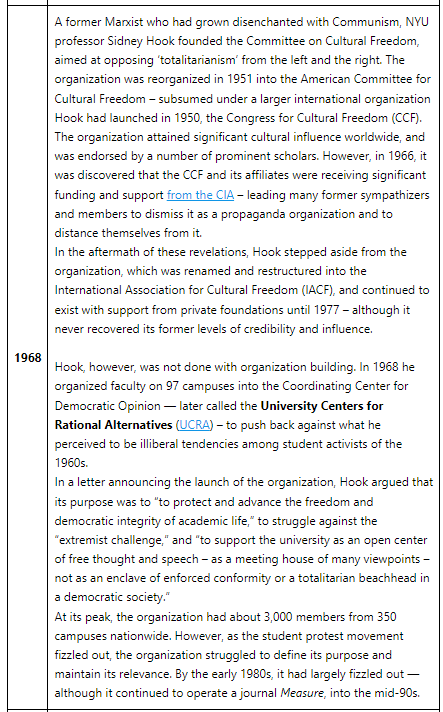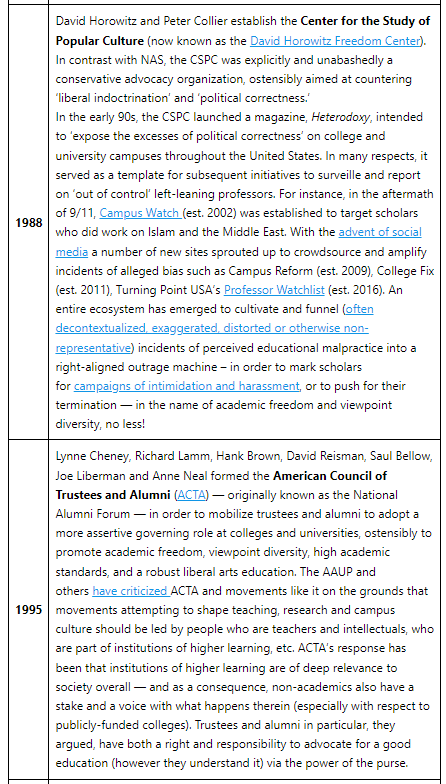100 Years of Viewpoint Diversity Activism
Heterodox Academy was launched in 2015 to understand and address the lack of ideological diversity in the social sciences. Many other organizations have tried to address this issue over the years.
In a previous essay for Heterodox Academy I demonstrated that virtually all of the concepts and arguments that people are arguing about today have, in fact, been around for decades. None of this stuff is new. Indeed, there have been at least two other ‘Great Awokenings’ in the United States since World War II.
In a follow-up, I highlighted that research exploring the ways positionality and homogeneity affect knowledge production dates back more than a century but has largely failed to have a robust institutional impact, in part because scholars working on these issues bifurcated into a set of mutually-antagonistic camps: one camp focused on ‘identity commitments’ (race, gender, sexuality, class), another on ‘ideology per se’ (political, religious, philosophical commitments).
In light of these realities, it should not surprise readers that Heterodox Academy (HxA) is far from the first organization founded ostensibly to promote open inquiry, viewpoint diversity and/ or constructive disagreement. However, it may be instructive to walk through some of these predecessors in order to explore 1) What, if anything, HxA is doing differently from previous attempts that failed, and 2) what is HxA contributing that is non-redundant with predecessor organizations that are still around today.
That is, by looking at how HxA differs from these previous attempts, we can understand its novel contribution to the higher ed landscape – and gain a deeper understanding of the history, trajectory and limitations of the viewpoint diversity movement up to now.
While HxA shares some similarities with some of these previous movements (and has served as an implicit rebuke of others), the organization was also intended to be something new and different.
Like the Heteorodox Economics movement, HxA pushes back on orthodoxies in scholarship – but unites scholars across disciplines and fields.
Similar to many other groups and movements above, HxA recognizes that there is a dearth of engagement with conservative, libertarian, religious and other non-left/ secular views across most lines of social research – and the organization sees this as a problem. However, (unlike many others operating in this space) HxA does not take the position that conservative, libertarian or religious thought is ‘correct,’ nor that the prevailing secular and left-aligned values are ‘wrong.’ Instead, the organization recognizes homogeneity itself as a problem for research and teaching. It leads to blind spots and overconfidence, untested axioms, underexplored possibilities, it contributes to a disconnect between scholars, the public and policymakers – undermining the credibility, impact and continued viability of research and institutions of higher learning. These are the problems Heterodox Academy was founded to help address.
Put another way: HxA does not advocate for any particular ideology (conservative, libertarian, Christian, Jewish, Muslim) nor any particular tradition or canon (such as the classical western tradition). They were intended to be focused on the process of research and pedagogy, making sure it is as inclusive, free, rigorous and fair as it can be. Increasing ideological diversity is one means to this end – although the organization also supports other diversity and inclusion efforts, for instance those aimed at increasing participation among women, ethnic or racial minorities, those from modest socio-economic backgrounds, rural areas, etc. Indeed, Heterodox Academy was perhaps the first initiative of its sort — that embraces and seeks to address both ideology and identity issues in knowledge production, and to understand the complex relationships between these domains.
While recognizing the necessity of legal action at times to push back against incursions on freedom and defend scholars under fire for their ideas or research — as an organization, Heterodox Academy has been consistently opposed to attempts at legislating viewpoint diversity, etc. As HxA co-founder and board chair Jonathan Haidt put it, “The political world is playing a very different game, and it’s a game that almost always damages our ability to do our work in universities.”
Unlike the UCRA — which was formed in response to student protests and struggled to find a purpose as campus disruptions died down — Heterodox Academy was founded prior to (rather than in response to) the latest major outbreak of campus eruptions (contemporaneous with the 2016 election). Its founding purpose had nothing to do with the culture wars or ‘kids these days.’ As noted above, there were plenty of already-existing organizations focused on the culture wars. Indeed, other such movements have risen up and largely fizzled out in the years since Heterodox Academy was formed, and new organizations are cropping up all the time. Yet very little has been accomplished with all this sound and fury beyond denigrating young people, delegitimizing expertise, polarizing institutions of higher learning, and inviting more outside meddling into colleges and universities.
There are innumerable organizations ostensibly focused on ending the culture wars too. Indeed, there was an explosion of initiatives focused on community building, civil discourse, and bridging partisan divides in the wake of Trump (some focused on campuses, others the broader society). While these efforts are laudable, HxA was not intended to serve as one more player in the over-crowded ‘civic culture’ space. Instead, it was an organization with an idiosyncratic mission and approach – one that set it apart from both its predecessors and contemporaries, and which is worth reiterating here:
Heterodox Academy was intended to be focused, first and foremost, on improving research and teaching. Viewpoint diversity (again, understood to include both demographic and ideological dimensions) was emphasized as a means of improving knowledge production. It was not an end to itself, nor was the goal to advance any particular ideology or worldview within institutions of higher learning.
Critically, the goal was not to oppose ideas associated with the left either. Indeed, concerns about ideological diversity as actually flowing naturally from the kind of critiques raised by queer theorists, critical race theorists, postcolonial theorists, feminist standpoint epistemology, etc. Taking those ideas to their logical conclusion should lead one to interrogate the extent to which one’s own ideological commitments (and especially the homogeneity of convictions like one’s own within a field) may undermine the ability to understand certain phenomena, may lead scholars to ignore key perspectives and inconvenient facts in the pursuit of preferred narratives and policies – ultimately leading them to pursue courses of action that do not, in fact, empower or serve the people they are supposed to be empowering or serving, and do not reflect others’ own values and perceived interests.
Indeed, my first exposure to the importance of viewpoint diversity, the problems with homogeneity and groupthink, etc. didn’t come from reading people like Jon Haidt, but instead Edward Said, Foucault, Fanon, Gramsci, Noam Chomsky and Judith Butler.HxA was intended to be an organization by and for academic insiders who have deep knowledge of the institutions they are trying to reform and the challenges they face – and who are invested in institutions of higher learning, with a profound stake in their flourishing. This is in contrast with many other organizations dominated by people who are not part of institutions of higher learning and do not understand them particularly well.
Heterodox Academy was committed to conducting original research, and to curating and disseminating empirical research by others, in order to facilitate pragmatic and evidence-based solutions to the challenges members were working to address. This is in contrast with other organizations that traffic in hyperbole and anecdote, or who proffer empty platitudes in response to practical problems.
HxA was intended to be constructive in nature – not just harping on problems but helping to work through possible solutions and to highlight exemplars — to provide data, frameworks, tools and resources that members could put to use.
Heterodox Academy was oriented around grassroots reform – hoping to inspire, mobilize and support academics to themselves lead the charge in the disciplines and institutions they are embedded in –to tackle concrete problems in their own specific contexts. This is in contrast with organizations that promote coercive, top-down and/or outside-in approaches to addressing problems within institutions of higher learning.
Collectively, these represented genuine innovations to what others had been trying to do up to then, and indeed, what other organizations are trying to do today. To the extent that HxA leans into the elements that set it apart, it will likely remain a vital element in the higher ed landscape, and may be able to help accomplish positive change in a way that many others have not. Time will tell.











